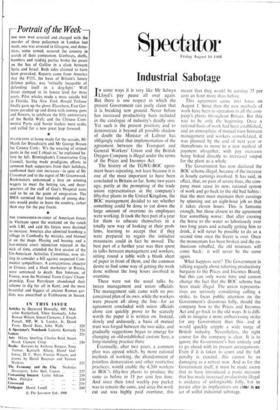Industrial Sabotage
The history of the TGWU-BOC agree- ment bears repeating, not least because it is one of the most important to have been concluded in Britain so far. Some two years ago, partly at the prompting of the trade union representatives at the company's fifty-five plants in the United Kingdom, the BOC management decided to see whether something could be done to cut down the large amount of overtime its employees were working. It took the best part of a year for them to educate themselves in a totally new way of looking at their prob- lems, learning to accept that if they were prepared to regain the initiative mountains could in fact be moved. The best part of a further year was then spent in talks between management and workers, sitting round a table with a blank sheet of paper in front of them, and the common desire to find some way of getting the work done without the long hours involved in overtime.
These were not the usual talks be- tween management and union officials. The management side came with no pre- conceived plan of its own, while the workers were present all along the line—for an agreement concluded with union officials alone can quickly prove to be scarcely worth the paper it is written on. Instead, slowly and arduously, a basis of mutual trust was forged between the two sides, and gradually suggestions began to emerge for changing an old-established custom here, a long-standing practice there.
Eventually, after two years, a common plan was agreed which, by more rational methods of working, the abandonment of pointless demarcation and other restrictive practices, would enable the 4,200 workers at BOC's fifty-five plants to produce the same as before in 15 per cent less time. And since their total weekly pay packet was to remain the same, and since the work cut out was highly paid overtime, this meant that they would be earning 25 per cent an hour more than before.
This agreement came into force on August 1. Since then the new methods of work have been in operation in all the com- pany's plants throughout Britain. But this was to be only the beginning. Once a rational basis of work had been established, and an atmosphere of mutual trust between management and workers consolidated, it was planned by the end of next year or thereabouts to move to a new method of payment altogether, with pay increases being linked directly to increased output for the plant as a whole.
The Government has now declared the BOC scheme illegal. because of the increase in hourly earnings involved. It has said, in effect, that, on pain of severe fines, the com- pany must cease its new, rational system of work and go back to the old bad habits: that the men must maintain their earnings by spinning out an eight-hour job so that it takes eleven hours. This is fantastic enough, but those closest to the agreement fear something worse: that after coaxing the horse to the water so laboriously over two long years and actually getting him to drink, it will never be possible to do so a second time once the freeze is over. Once the momentum has been broken and the en- thusiasm rebuffed, the old mistrusts will come back : it will never be the same again.
What happens next? The Government is talking vaguely about referring productivity bargains to the Prices and Incomes Board; but- this can only waste time and cannot change the fact that the BOC scheme has been made illegal. The union representa- tives are seriously considering calling a strike, to focus public attention on the Government's disastrous folly. should the company bow to the Prices and Incomes Act and go back to the old ways. It is diffi- cult to imagine a more embarrassing strike for any Government than this—and it would quickly cripple a wide range of British industry. Nevertheless, the right course for the company is clear. It is to ignore the Government's ban entirely and to go ahead with its present arrangements.
Even if it is taken to court and the full penalty is exacted, this cannot be as damaging as a retreat now. And as for the Government itself, it must be made aware that to have introduced a panic measure that has made increased productivity illegal is evidence of unforgivable folly, but to persist after its implications are clear is an act of wilful industrial sabotage.






























 Previous page
Previous page